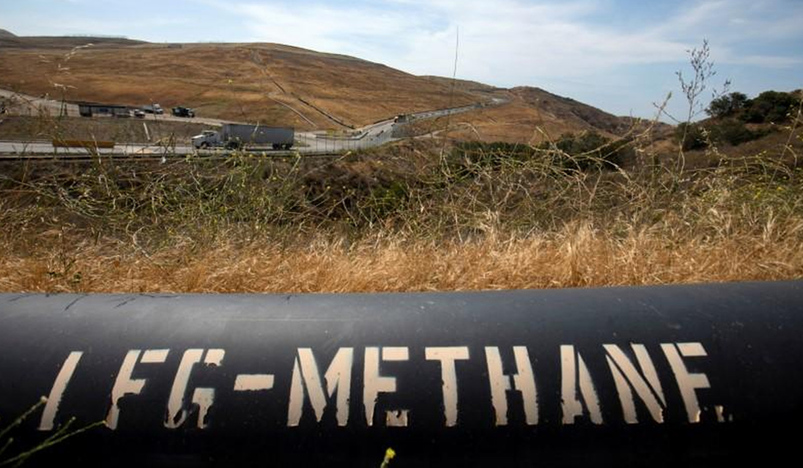
A pipeline that moves methane gas from the Frank R. Bowerman landfill to an onsite power plant is shown in Irvine, California, California, U.S., June 15, 2021. REUTERS/Mike Blake/
Aug 9 - In four decades of climate negotiations, the world has focused intensely and exclusively on the most abundant climate-warming gas: carbon dioxide.
This year, scientists are urging a focus on another potent greenhouse gas – methane – as the planet's best hope for staving off catastrophic global warming.
Countries must make "strong, rapid and sustained reductions" in methane emissions in addition to slashing CO2 emissions, scientists warn in a landmark report by the U.N. Intergovernmental Panel on Climate Change released Monday. read more
The plea could cause consternation in countries opting for natural gas as a cleaner alternative to CO2-belching coal. It also could pose challenges for countries where agriculture and livestock, especially cattle, are important industries.
But while both methane and CO2 warm the atmosphere, the two greenhouse gases are not equal. A single CO2 molecule causes less warming than a methane molecule, but lingers for hundreds of years in the atmosphere whereas methane disappears within two decades.
The report puts "a lot of pressure on the world to step up its game on methane," said IPCC report reviewer Durwood Zaelke, president of the Institute for Governance and Sustainable Development in Washington, D.C.
“Cutting methane is the single biggest and fastest strategy for slowing down warming,” Zaelke said.
BUT WHY METHANE NOW?
Today’s average global temperature is already 1.1C higher than the preindustrial average, thanks to emissions pumped into the air since the mid-1800s. But the world would have seen an additional 0.5C of warming, had skies not been filled with pollution reflecting some of the sun’s radiation back out into space, the report says.
As the world shifts away from fossil fuels and tackles air pollution, those aerosols will disappear – and temperatures could spike.
Quickly reducing methane could “counteract” this effect, while also improving air quality, said IPCC report summary author Maisa Rojas Corradi, an atmospheric scientist at the University of Chile.
On a global scale, methane emissions are responsible for around 30% of warming since the pre-industrial era, according to the United Nations.
But the role of methane, aerosols and other short-lived climate pollutants had not been discussed by the IPCC until now.
“The report draws attention to the immediate benefits of significant reductions in methane, both from an atmospheric concentration point of view, but also the co-benefits to human health from improved air quality,” said Jane Lubchenco, deputy director for climate and environment at the White House Office of Science and Technology Policy.
METHANE MOMENTUM
Updates in technology and recent research suggest that methane emissions from oil and gas production, landfills and livestock have likely been underestimated.
The report sends a loud signal to countries that produce and consume oil and gas that they need to incorporate “aggressive oil and gas methane reduction plans into their own climate strategies,” said Mark Brownstein, senior vice president of energy at Environmental Defense Fund.
Landfill and energy company emissions might be the easiest to tackle, he said. Large-scale agricultural methane is tougher, because scaled-up replacement technology does not exist.
The EU is proposing laws this year that will force oil and gas companies to monitor and report methane emissions and to repair any leaks.
The United States is expected to unveil methane regulations by September that are more stringent than rules issued by the Obama administration, which were then rolled back under former President Donald Trump.
The United States and the EU account for more than a third of global consumption of natural gas.
But major economies without strict regulations on oil and gas production or agriculture, such as Brazil and Russia, are also likely to be high methane emitters, said IPCC co-author Paulo Artaxo, an environmental physicist at University of Sao Paulo.
“(Methane) leakage from gas and also oil wells is very difficult to quantify,” he said. If countries are not looking, they will not find it.
Some environmental groups and government officials have urged a global agreement on methane, such as the Montreal Protocol that tackled ozone depletion.
Such an agreement could start with methane from the oil and gas industry, which already has technology to curb those emissions, said Armond Cohen, executive director of the Clean Air Task Force, a Boston-based climate technology group.
“It's not rocket science. There's no exotic technology required here,” he said. “So let's start there.”
Reporting by Valerie Volcovici, Andrea Januta and Jake Spring; Editing by Katy Daigle and Lisa Shumaker
.jpg)
Qatar Secures Place Among the World's Top 10 Wealthiest Nations
.jpg)
Hamad International Airport Witnesses Record Increase in Passenger Traffic

Saudi Arabia: Any visa holder can now perform Umrah

What are Qatar's Labour Laws on Annual Leave?
Leave a comment